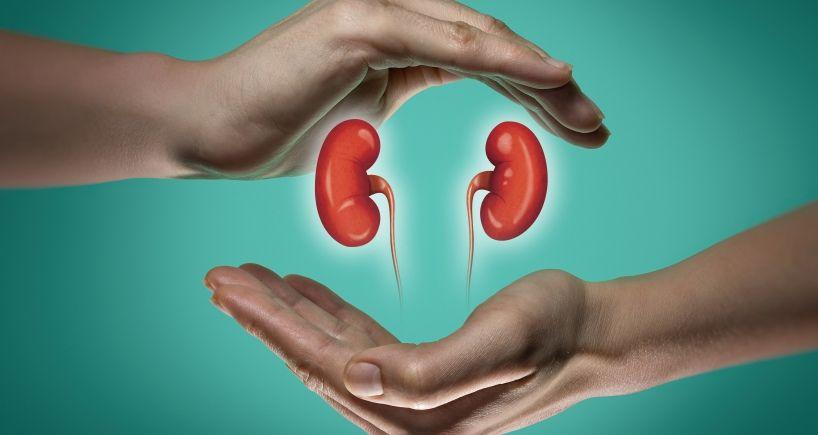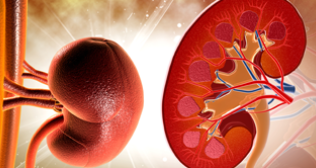
Chronic Kidney Disease: Robust Prevention and Early Intervention Strategies To Combat This Renal Condition
Receiving a diagnosis of Chronic Kidney Disease (CKD) can be a daunting experience, but it's crucial to remember that there are effective prevention and early intervention steps you can take to manage the condition and enjoy a better quality of life. Early detection and intervention are critical in slowing the progression of CKD and preventing complications. Being aware of the warning signs and ways to avoid further damage to the renal organs, if you suspect you may have CKD is vital for maintaining kidney health.
What Is Chronic Kidney Disease?
Chronic kidney disease (CKD) is a significant health concern affecting millions worldwide. According to the medical data, around 10 percent of the Indian population suffers from some degree of renal impairment and 1 lakh new cases are recorded annually.
Chronic Kidney Disease is a progressive condition that refers to a gradual loss of kidney function over time. While this condition has no cure, early detection and intervention can significantly slow its progression and improve patient outcomes.
The Pivotal Role Of Prevention and Early Intervention:
Before diving into strategies for prevention and early intervention, it's essential to understand what CKD is and its risk factors. Chronic kidney disease occurs when this vital paired organ is damaged and cannot filter blood effectively, accumulating waste and excess fluid in the body. Common risk factors for CKD include diabetes, high blood pressure, heart disease, obesity, family history of kidney disease and aging.
Strategies for Prevention:
Manage Underlying Health Conditions:
Effective management of conditions like diabetes and high blood pressure can significantly bring down the risk of CKD. Patients should consult their doctor regularly to control these conditions through medication, lifestyle modifications and regular monitoring.
Maintain a Healthy Lifestyle:
One should adopt a healthy lifestyle to help prevent CKD. Choose a balanced diet low in sodium, saturated fats, and processed foods, maintain a healthy weight, engage in regular workouts, avoid smoking and limit alcohol consumption.
Gauge Water Consumption:
The intake of water consumption differs from patient to patient. While patients suffering from stage 1 and 2 CKD are encouraged to drink 8 glasses of water daily, those with stages 3, 4, and 5 may have to limit their water and salt consumption.
Monitor Kidney Function:
Regular monitoring of kidney function through simple blood and urine tests can help detect CKD in its early stages when interventions are most effective. Talk to your doctor about the importance of routine screenings, especially if they have risk factors for CKD.
Strategies for Early Intervention:
Medication Management:
Patients diagnosed with CKD may require medications to manage other underlying chronic conditions, such as hypertension and diabetes, which can exacerbate kidney damage. Consult your doctor regularly to closely monitor medication regimens, adjusting doses as needed to prevent further kidney injury.
Dietary Modifications:
Consult with a dietitian for personalized meal plans that promote kidney health. This may involve limiting phosphorus, potassium and protein intake and monitoring fluid intake to prevent fluid overload.
Blood Pressure Control:
Controlling blood pressure is crucial for slowing the progression of CKD. Healthcare providers may prescribe medications, such as ACE inhibitors or angiotensin II receptor blockers to lower blood pressure.
Smoking Cessation:
Smoking is a significant risk factor for CKD progression and cardiovascular disease. If you are a habitual smoker, talk to your doctor or counselor for smoking cessation support and to quit smoking altogether to improve kidney health and overall well-being.
Education and Support:
Providing education and support to CKD patients is essential for effectively empowering them to manage their condition. This may include educating patients about medication adherence, dietary restrictions, symptom management and when to seek medical attention.
Supporting patients with chronic kidney disease requires a comprehensive approach addressing prevention and early intervention strategies. By managing underlying health conditions, promoting healthy lifestyle behaviour and implementing timely interventions, our Nephrologists can help slowdown the progression of CKD and improve the quality of life for affected individuals.
Fortis Hospitals, Cunningham Road, Bengaluru, houses a highly advanced Nephrology department, helmed by extensively trained Nephrologists and paramedical staff.
Our highly regarded Nephrology Department offers exceptional care for all your kidney concerns, whether acute or chronic. Equipped to handle even complex cases like ABO incompatible transplants, supported by cutting-edge facilities and a seasoned medical team, the department offers round-the-clock services.
From children to adults, our renowned specialists – kidney transplant surgeons, nephrologists, and urologists – work seamlessly to provide the best possible outcomes. Comprehensive post-operative care at Fortis Hospitals, CG Road, minimizes infection risks and promotes healing.
Our expert dialysis team, including nurses, technicians, and dieticians, offer a range of treatment options like peritoneal, nocturnal, short daily, and traditional haemodialysis for both children and adults.
We understand the emotional toll of kidney disease on patients and their loved ones. Our compassionate team here is dedicated to providing hope, guidance and superior care, prioritizing your comfort and satisfaction at every step.
Popular Searches :
Hospitals: Cancer Hospital in Delhi | Best Heart Hospital in Delhi | Hospital in Amritsar | Hospital in Ludhiana | Hospitals in Mohali | Hospital in Faridabad | Hospitals in Gurgaon | Best Hospital in Jaipur | Hospitals in Greater Noida | Hospitals in Noida | Best Kidney Hospital in Kolkata | Best Hospital in Kolkata | Hospitals in Rajajinagar Bangalore | Hospitals in Richmond Road Bangalore | Hospitals in Nagarbhavi Bangalore | Hospital in Kalyan West | Hospitals in Mulund | Best Hospital in India | | Cardiology Hospital in India | Best Cancer Hospital in India | Best Cardiology Hospital in India | Best Oncology Hospital In India | Best Cancer Hospital in Delhi | Best Liver Transplant Hospital in India
Doctors: Dr. Rana Patir | Dr. Rajesh Benny | Dr. Rahul Bhargava | Dr. Jayant Arora | Dr. Anoop Misra | Dr. Manu Tiwari | Dr. Praveer Agarwal | Dr. Arup Ratan Dutta | Dr. Meenakshi Ahuja | Dr. Anoop Jhurani | Dr. Shivaji Basu | Dr. Subhash Jangid | Dr. Atul Mathur | Dr. Gurinder Bedi | Dr. Monika Wadhawan | Dr. Debasis Datta | Dr. Shrinivas Narayan | Dr. Praveen Gupta | Dr. Nitin Jha | Dr. Raghu Nagaraj | Dr. Ashok Seth | Dr. Sandeep Vaishya | Dr. Atul Mishra | Dr. Z S Meharwal | Dr. Ajay Bhalla | Dr. Atul Kumar Mittal | Dr. Arvind Kumar Khurana | Dr. Narayan Hulse | Dr. Samir Parikh | Dr. Amit Javed | Dr. Narayan Banerjee | Dr. Bimlesh Dhar Pandey | Dr. Arghya Chattopadhyay | Dr. G.R. Vijay Kumar | Dr Ashok Gupta | Dr. Gourdas Choudhuri | Dr. Sushrut Singh | Dr. N.C. Krishnamani | Dr. Atampreet Singh | Dr. Vivek Jawali | Dr. Sanjeev Gulati | Dr. Amite Pankaj Aggarwal | Dr. Ajay Kaul | Dr. Sunita Varma | Dr. Manoj Kumar Goel | Dr. R Muralidharan | Dr. Sushmita Roychowdhury | Dr. T.S. MAHANT | Dr. UDIPTA RAY | Dr. Aparna Jaswal | Dr. Ravul Jindal | Dr. Savyasachi Saxena | Dr. Ajay Kumar Kriplani | Dr. Nitesh Rohatgi | Dr. Anupam Jindal |
Specialties: Heart Lung Transplant | Orthopedic | Cardiology Interventional | Obstetrics & Gynaecology | Onco Radiation | Neurosurgery | Interventional Cardiology | Gastroenterologist in Jaipur | Neuro Physician | Gynecologist in Kolkata | Best Neurologist in India | Liver Transfer



















